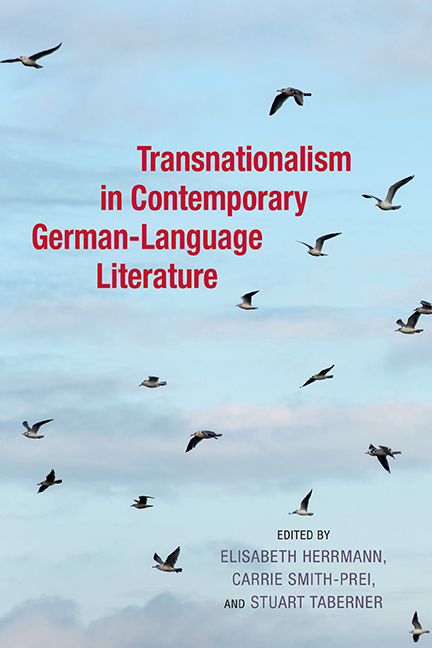12 - Transnational Politics in Friedrich Dürrentmatt's Der Auftrag and Wolfgang Herrndorf's Sand
Published online by Cambridge University Press: 10 June 2021
Summary
Die Wüste änderte die Anschauungen rasch.
[The desert altered perceptions rapidly.]
—Wolfgang HerrndorfIN WOLFGANG HERRNDORF's NOVEL Sand, published in 2011, the reader's attention may be drawn to the following line: “Der Beobachter ist der Beobachtete” (S 117; The observer is the observed). This line resonates with another text written twenty-five years earlier, set like Sand in an unnamed North African country: Friedrich Dürrenmatt's 1988 Der Auftrag oder Vom Beobachten des Beobachters der Beobachter: Novelle in 24 Sätzen (The Assignment, or On the Observing of the Observer of the Observers). On the one hand, both texts depict economic interests like arms deals between Western nations and North Africa, along with political interventions, such as espionage. On the other, they posit North African countries as corrupt, terrorist states that are key players in international weapon deals with Western countries. Both texts utilize the particular geographical space of North Africa and the associated sociocultural and political stereotypes to turn the gaze back on Western countries and to critically question their investment in global transnational relations.
In the following chapter, I will examine two themes: the motif of sand as a representation of the instability of identity, and transnational political conflicts that are present in the Middle East. Relating to the first of these, I will analyze how a concept of subjectivity is constructed in the two texts, formed in one sense by a panoptical structure, and in another by power structures as developed by Foucault. In examining the second, I will evaluate the political implications of the two texts, with reference to Giorgio Agamben, Noam Chomsky, and other key thinkers. The analysis will focus on the figure of the terrorist and the definition of terrorist acts, demonstrating that in actuality, both texts question how terrorism and legal and nonlegal violence are defined or point toward the construction of certain political images. Finally, I will bring the two strands together to argue that the instability of identity in the texts is mirrored by the instability of political-identity positions.
In Der Auftrag, the protagonist is the film director F., who is famous for her film portraits, and “sich vorgenommen hatte, neue Wege zu beschreiten und der noch vagen Idee nachhing, ein Gesamtporträt herzustellen, jenes unseres Planeten nämlich” (had resolved to explore new paths and was pursuing the still vague idea of creating a total portrait, namely a portrait of our planet).
- Type
- Chapter
- Information
- Transnationalism in Contemporary German-Language Literature , pp. 247 - 264Publisher: Boydell & BrewerPrint publication year: 2015
- 2
- Cited by

